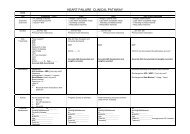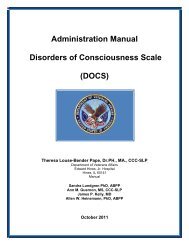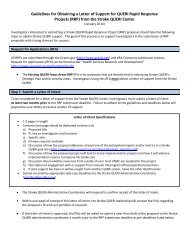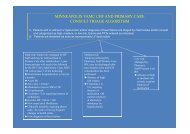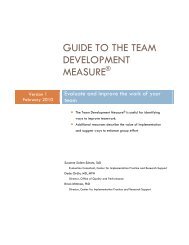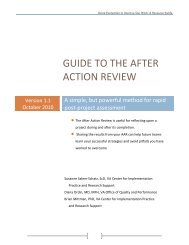The Veteran Supported Education Service Treatment Manual: VetSEd
The Veteran Supported Education Service Treatment Manual: VetSEd
The Veteran Supported Education Service Treatment Manual: VetSEd
Create successful ePaper yourself
Turn your PDF publications into a flip-book with our unique Google optimized e-Paper software.
163 | P a g e<br />
Peer <strong>VetSEd</strong> provider‘s background, expertise and prior experiences with<br />
supervision<br />
Evaluation process and fidelity measures for <strong>VetSEd</strong> services<br />
Boundaries and confidentiality and the relevance of ethical considerations<br />
<strong>The</strong> supervisor‘s sharing about background and expertise should include any prior<br />
experience with supported education services and understanding and prior experience<br />
with peer support providers. In some instances a peer <strong>VetSEd</strong> provider‘s clinical<br />
supervisor may have limited experience with one or both of these domains. Nevertheless,<br />
it is recommended that supervisors be honest about their expertise and frame any<br />
expertise gaps as shared learning opportunities for the supervisor and peer <strong>VetSEd</strong><br />
provider.<br />
Supervisors are encouraged to broach the topic of evaluation and fidelity processes<br />
during the first supervision session. <strong>The</strong>se discussions should be collaborative and mutual<br />
in nature, so that the peer <strong>VetSEd</strong> provider and supervisor are in agreement about how<br />
the peer will provide feedback to the supervisor, how the peer will be evaluated, and how<br />
fidelity to the <strong>VetSEd</strong> process will be evaluated. Conversations about diversity issues and<br />
ethical considerations are encouraged during initial supervisory sessions. In addition to<br />
reviewing local state and the VA policies and procedures, <strong>VetSEd</strong> supervisors should<br />
provide peer <strong>VetSEd</strong> staff with a copy of any state code of ethics for peer providers.<br />
While not every state has such an ethics code, several states, including North Carolina,<br />
Georgia, and Michigan do have such codes. See http://psssowo.unc.edu/files/CODE_OF_ETHICS_FOR_PSS.pdf<br />
for North Carolina‘s example.<br />
It is expected that these initial supervisory conversations will take more than one meeting<br />
and, in fact, these topics should be revisited from time to time during the supervisory<br />
experience. <strong>The</strong>se initial conversations set the stage for subsequent supervision sessions,<br />
so supervisors and peer <strong>VetSEd</strong> providers are encouraged to engage these discussions<br />
wholeheartedly. It can also be beneficial for <strong>VetSEd</strong> supervisors and peer providers to<br />
read articles and book chapters (Haynes, Corey & Moulton, 2010) about supervision, as<br />
well as the Depression and Bipolar Support Alliance‘s (2010) report on Peer Support<br />
Supervision in VA Mental Health <strong>Service</strong>s.<br />
D. Core Element #2: Promoting Peer Identity of the <strong>VetSEd</strong> Provider<br />
One of the most important strengths of a peer <strong>VetSEd</strong> provider is his/her lived experience<br />
with mental health recovery and educational attainment. In fact, providers/helpers who<br />
are designated as peers, and trained and certified as peer support specialists, serve a



